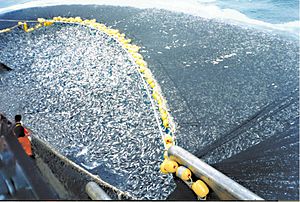
Back Oorbevissing Afrikaans إفراط في صيد الأسماك Arabic Həddindən artıq balıq ovu Azerbaijani Pangana na pagsira BCL Sobrepesca Catalan Nadměrný rybolov Czech Gorbysgota Welsh Überfischung German Υπεραλίευση Greek Troa fiŝkaptado Esperanto


Overfishing is the removal of a species of fish (i.e. fishing) from a body of water at a rate greater than that the species can replenish its population naturally (i.e. the overexploitation of the fishery's existing fish stock), resulting in the species becoming increasingly underpopulated in that area. Overfishing can occur in water bodies of any sizes, such as ponds, wetlands, rivers, lakes or oceans, and can result in resource depletion, reduced biological growth rates and low biomass levels. Sustained overfishing can lead to critical depensation, where the fish population is no longer able to sustain itself. Some forms of overfishing, such as the overfishing of sharks, has led to the upset of entire marine ecosystems.[1] Types of overfishing include growth overfishing, recruitment overfishing, and ecosystem overfishing.
The ability of a fishery to recover from overfishing depends on whether its overall carrying capacity and the variety of ecological conditions are suitable for the recovery. Dramatic changes in species composition can result in an ecosystem shift, where other equilibrium energy flows involve species compositions different from those that had been present before the depletion of the original fish stock. For example, once trout have been overfished, carp might exploit the change in competitive equilibria and take over in a way that makes it impossible for the trout to re-establish a breeding population.
Since the growth of global fishing enterprises after the 1950s, intensive fishing has spread from a few concentrated areas to encompass nearly all fisheries. The scraping of the ocean floor in bottom dragging is devastating to coral, sponges and other slower-growing benthic species that do not recover quickly, and that provide a habitat for commercial fisheries species. This destruction alters the functioning of the ecosystem and can permanently alter species' composition and biodiversity. Bycatch, the collateral capture of unintended species in the course of fishing, is typically returned to the ocean only to die from injuries or exposure. Bycatch represents about a quarter of all marine catch. In the case of shrimp capture, the mass of bycatch is five times larger than that of the shrimp caught.
A report by FAO in 2020 stated that "in 2017, 34 percent of the fish stocks of the world's marine fisheries were classified as overfished".[2]: 54 Mitigation options include: Government regulation, removal of subsidies, minimizing fishing impact, aquaculture and consumer awareness.
- ^ Scales, Helen (29 March 2007). "Shark Declines Threaten Shellfish Stocks, Study Says". National Geographic News. Archived from the original on November 6, 2007. Retrieved 1 May 2012.
- ^ The State of World Fisheries and Aquaculture 2020. FAO. 2020. doi:10.4060/ca9229en. hdl:10535/3776. ISBN 978-92-5-132692-3. S2CID 242949831.